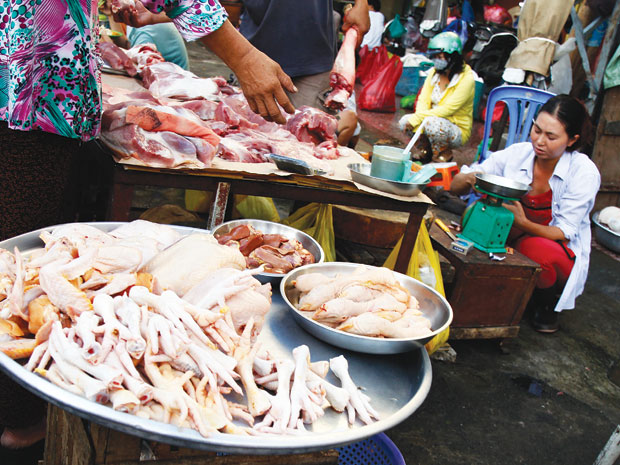|
Foreigners may replace Vietnamese in
livestock industry from 2015
From 2015, Vietnamese products of pork,
chicken and poultry eggs would no longer enjoy the local production
protection policies. It is expected that by that time, Thai, Indonesian and
Malaysian products would flood the domestic market.

Thai chicken need 6 hours only to
arrive in HCM City
Pham Duc Binh, General Director of Thanh Binh Company,
who is also Deputy Chair of the Vietnam Animal Feed Association, said with
the current conditions of the livestock industry, which is far inferior to
regional countries in terms of the scale, productivity, production costs and
quality, Vietnamese enterprises and farmers would suffer big difficulties
once the protection is removed.
Also depending on the breeders’ quality,
A worker in
Especially, Thai farmers can access bank loans at the
low costs, enjoy tax incentives and the government’s support. All of these
help make their production costs lower by 15-20 percent than
Binh said 10 years ago, he once came to
“Thais can provide fowls at very low prices. And I am
sure that Thai chicken need only six hours to arrive to
Other Asian countries can sell chicken at low prices to
Domestic farmers bear hard pressure
Since taking a loss, foreign invested enterprises have
been trying to apply different measures to cut losses. They have prolonged
the farming time and cut down the output.
According to Nguyen Dang Vang, Chair of the Vietnam
Livestock Association, the flcok of fowls has been narrowed considerably. In
2011, three big foreign invested enterprises -- namely C.P, Emivest, Japfa,
bred 120 million fowls. The figure dropped to 70 million in 2012 and it is
expected to decrease further in 2013.
“Up to 50 percent of the farms in the north have
stopped farming,” Vang said.
Vang went on to say that the tariff cuts within the
framework of AFTA would have serious impacts on domestic farmers. He thinks
that foreign big groups in the fields have realized that there are no more
great opportunities for them. Therefore, they have been taking steps to
gradually scale down the farming in
Source: SGTT
|
Thứ Hai, 17 tháng 6, 2013
Đăng ký:
Đăng Nhận xét (Atom)
Không có nhận xét nào:
Đăng nhận xét